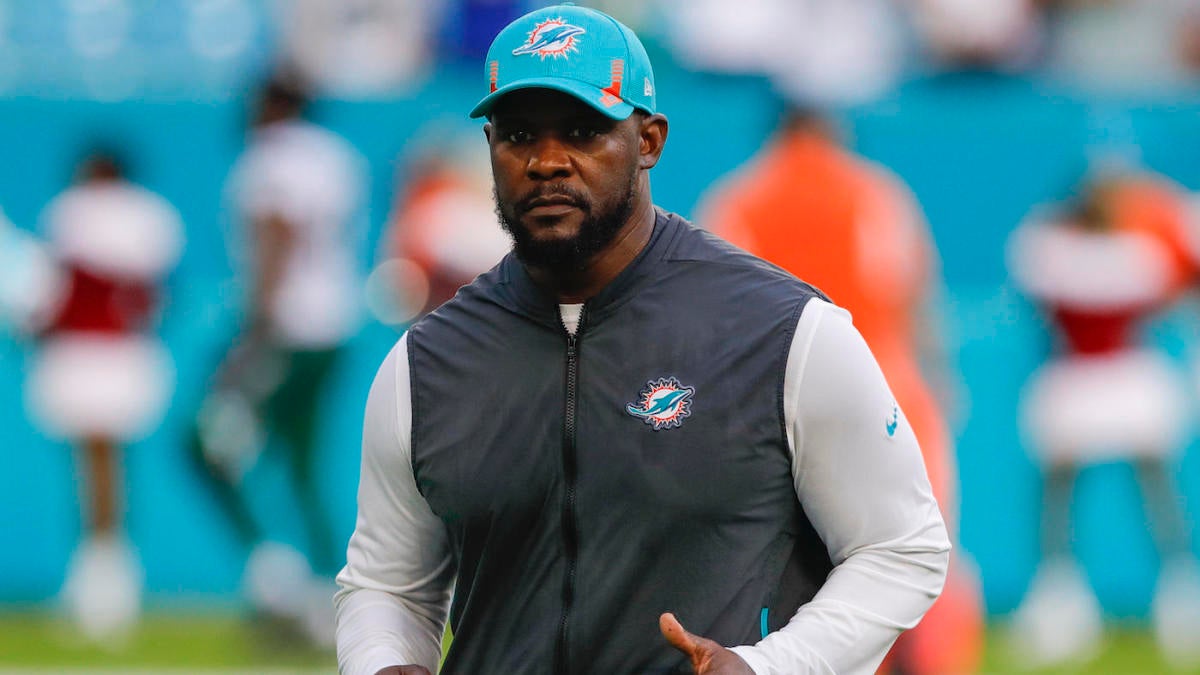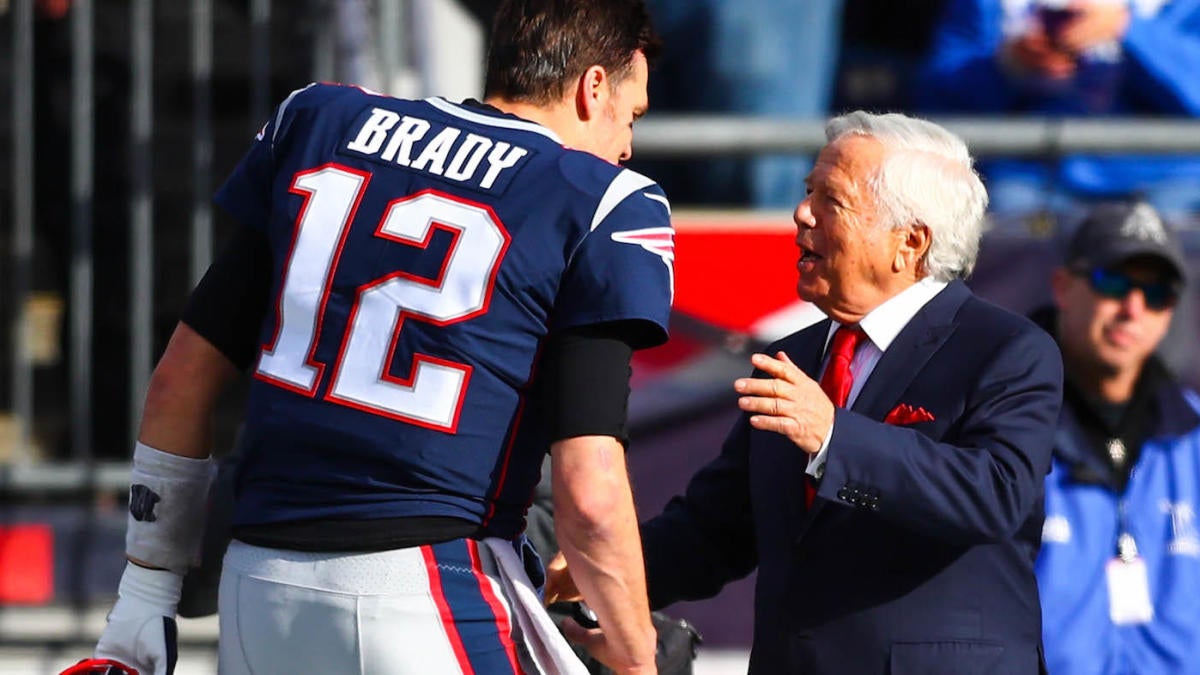NFL insider: Brian Flores’ lawsuit shines bright light on lack of diversity in NFL head coaching hires
Written by ABC AUDIO ALL RIGHTS RESERVED on February 3, 2022

The National Football League is proud of its policies ensuring a fair and equitable hiring process both at the league office and across its 32 individual clubs. The NFL has worked very hard to enhance and strengthen its policies regarding interviewing and hiring for top-level football positions and senior-level business positions. These are things that I know having covered race and the NFL closely for a decade, speaking as recently as three weeks ago to Black executives within the league and examining the league’s evolving policies.
Whether those efforts have led to success is debatable. At this moment in time, they appear to have led to some progress at the general manager rankings. They appear to have failed miserably at head coach. How one measures success across teams at other positions, or within the league office, determines whether you believe these policies are ultimately effective.
It’s the “lead a horse to water, can’t make him drink” adage. The league can’t force individual team owners — the overwhelming majority of them white — to actually value diversity and live it through their actions and hires. NFL EVP Troy Vincent can speak passionately about the work they’ve put in. NFL commissioner Roger Goodell can hit his talking points incredibly well and take the issue of diversity seriously. Other league executives can radiate optimism that this year will be the year these measures work. Until we get to next year, which it then will be the year.
The NFL has created these policies, and for anyone to believe the NFL takes these policies seriously, the league must thoroughly investigate a credible claim that these policies were violated. If a prominent former head coach says one team violated the spirit of the Rooney Rule in 2019 and another created a sham interview just one week ago, the NFL has positioned itself — through decades of strong talk and policy changes — as an entity that must act quickly to review these claims and find out the truth for the sake of the league today and tomorrow.
But the NFL is also being sued. The league is a defendant in the lawsuit brought by Brian Flores Tuesday, along with the New York Giants, Denver Broncos, Miami Dolphins and any or all of the other 29 teams that may ultimately be brought into this class-action lawsuit. The NFL has the right to defend itself against these claims, just as all other defendants do.
“The NFL and our clubs are deeply committed to ensuring equitable employment practices and continue to make progress in providing equitable opportunities throughout our organizations,” said an NFL statement Tuesday night. “Diversity is core to everything we do, and there are few issues on which our clubs and our internal leadership team spend more time. We will defend against these claims, which are without merit.”
And there lies the rub. The NFL creates and proudly promotes policies, and then they threaten punishment if teams do not follow the policies. But when presented with a 58-page lawsuit filed Tuesday, which contains claims against three different NFL teams and alleged text messages with a head coach of a fourth team, the league states that these claims “are without merit.”
The Dolphins, according to a team statement, learned of the lawsuit through media reports. It appears the Giants and Broncos did, too. Flores has said he didn’t give a heads up to Belichick before including the alleged texts in the filing. For the NFL to truly believe Flores’ claims have no merit, the league must have conducted the quickest battery of depositions and discovery in modern legal history.
Of course, the league did not. And we are likely very far from whatever the ultimate conclusion of this suit is. But that statement highlights an inherent conflict for the NFL that it’s been trying so hard to fight against. You cannot promote a “see something, say something” environment just to scream “no merit” shortly after the lawsuit makes its way to the Southern District of New York. It is exactly what you should say when you’re being sued, and it’s the antithesis of that when you’re the one enforcing the policies.
What good are policies if they aren’t enforced?
I covered a Black quarterback (Cam Newton) and Latino head coach (Ron Rivera) daily for four years. I’ve been in stadiums where Colin Kaepernick took a knee. I’ve asked questions to Roger Goodell about ill-conceived national anthem policies. I speak to Black coaches, personnel executives and agents almost every day of the year. On Jan. 12, I spoke to Troy Vincent and Jonathan Beane, the NFL’s chief diversity and inclusion officer, about the very topic Flores’ lawsuit concerns.
I told the men (both of whom are Black, by the way) that there’s a belief around the league that even when teams violate the spirit of the Rooney Rule, there is no punishment. Only once has the league punished a team for violating the Rooney Rule, and that happened in 2003 when the league fined Lions president Matt Millen $200,000, I asked them how closely the league is monitoring any violations heading into the hiring cycle.
“As of two seasons ago when we went in and made the adjustment to the anti-tampering policy where we define our hiring practices of every club,” Vincent said, “every club, [after the] last preseason game going into Week 1 you have to report out your organizational structure with job descriptions. Failure to do so — and this leads into where we’re going — failure to report that back in to us, [will result in a] fine and draft-pick forfeitures. We have some teeth.
“We’ve had one violation where we’ve seen public accountability. You’re right. We’ve got to have teeth. We began that. What’s football currency? Draft picks, club fines.”
Vincent went on to praise the work done by various executives and by the teams who had reported everything properly in the three days since the end of the regular season.
Again, I ask: If a credible claim of a Rooney Rule violation is brought to the league and its response is dismissing that claim, what good were the policies? Where are the teeth? How can you be believed?
Is there merit to Flores’ suit?
In his alleged texts with Bill Belichick, Flores interprets Belichick’s text to mean the head coach has knowledge Brian Daboll has “landed” the Giants job. That text was sent on Monday, Jan. 24, shortly after the Giants finalized their eventual interview with Flores to take place on Jan. 27, according to the lawsuit.
To satisfy the Rooney Rule, teams are required to interview two external candidates of color. There’s a belief I’ve seen out there that the Giants had already fulfilled the Rooney Rule before Flores’ scheduled interview. They had not.
The Giants interviewed Leslie Frazier on Jan. 22. On Jan. 26, the team interviewed Patrick Graham, its defensive coordinator. Because Graham was an internal candidate, he would not have fulfilled the requirements. The Giants — who also interviewed Daboll, Dan Quinn and Lou Anarumo (all white men) — would have needed one other external minority candidate to fulfill the requirement.
That is critical to Flores’ claim of a sham interview. But what’s more crucial is what Belichick knew, when he knew and how he knew it, if the reading of the alleged texts is correct. If Belichick knew days before Flores was interviewed (and also Graham, for that matter) that Daboll had secured the job, and that knowledge was gained via a key Giants decision-maker, then there’s merit to this suit. I’d argue there’s incredibly strong merit.
I reported on the Giants GM and head coach searches for weeks, and since I’m analyzing what people knew and when they knew it, it’s only fair for me to do the same. I believed Daboll was the leading candidate for the job. I never, at any point, was led to believe Daboll had the job until the evening of Jan. 28, shortly before he was officially named the head coach. I reported the Giants were very interested in hearing from Flores and what led to his firing in Miami, and I also reported the Giants came away impressed with the answers they got from him. I reported that the job ultimately went to Daboll because of “alignment” with new GM Joe Schoen and ownership, as well as his background on the offensive side of the ball in helping unlock quarterback Daniel Jones in what is a significant year for the QB and his future with the team.
That’s what I reported, but I want to be clear that those reports do not necessarily conflict with Flores’ claims. What you believe isn’t always truth. What you are told, even by well-meaning sources, isn’t always reality. I make no claim to know whether Flores went through a sham interview.
Beyond that one monumental claim, there are plenty of others. Did Miami Dolphins owner Stephen Ross actually offer $100,000 to Flores for each lost game? Does Flores have proof of that, as he and his attorneys claimed on several national TV programs Wednesday morning? If so, Ross completely violated the competitive integrity of the sport — the entire foundation of the National Football League. It would be an offense so egregious that Goodell and fellow owners would have to force Ross out of ownership. In a statement, the Dolphins said “the implication that we acted in a manner inconsistent with the integrity of the game is incorrect.”
Throw in Ross’ financial ties to sports gambling, which were taking place concurrently with the Dolphins’ 5-11 season, and you have a world of trouble before you can even say the words “congressional subpoena.”
Did the Broncos also commit a sham interview in 2019 with Flores before hiring Vic Fangio as head coach? The team issued a statement calling the allegations “completely false,” though Flores stuck by his story again Wednesday morning.
Flores opens door for others to join him
By filing a class-action lawsuit, Flores is opening the door for others to join him. Former Browns head coach Hue Jackson has alleged evidence to a similar claim, according to his foundation’s director. Former Bengals head coach Marvin Lewis told ESPN Wednesday that he participated in what he believes was a sham interview with the Carolina Panthers in 2002 before they hired John Fox as their head coach. Over the years I’ve spoken to numerous Black coaches and executives who have felt they were interviewed only for the sake of checking a box.
Flores names several Black former coaches as recent examples of victims “of discriminatory conduct,” like Jim Caldwell, Steve Wilks, David Culley, Eric Bieniemy and others. He’s also named the remaining 29 NFL teams as potential defendants who, with evidence presented, “have engaged in discriminatory conduct towards” potential future plaintiffs.
Flores knows his NFL coaching career could very likely be over before he even turns 41 later this month. It seems impossible for the Texans or Saints to actually hire the man who has blown the whistle in this way, and who may literally be suing them any day now should someone join the lawsuit with a claim of discrimination against either team.
When it comes to diverse hiring policies, the NFL has tweaked and adjusted its rules. It has launched trial balloons just to bring them back to earth and try again more successfully later. It has created literal systems set up to monitor compliance, promote diversity and educate decision makers. It is a decades-long project, one that Goodell said last year the league was committed to “more than ever.” But in a short couple of hours, Brian Flores’ claims couldn’t be granted an ounce of merit by that same league.
If you think the storm is coming for the NFL and its teams, just look outside. The storm is already here.
The post NFL insider: Brian Flores’ lawsuit shines bright light on lack of diversity in NFL head coaching hires first appeared on CBS Sports.



